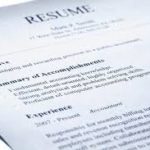How to Write Your First Resume
Roberta Gamza, Career Ink (www.careerink.com) | © 2017
Congratulations Graduate! You’ve earned that degree; now is the time to put it to work and land your first job. You’re going to need a resume!
Sounds intimidating, but it doesn’t have to be. The goal of a resume is to generate interest and interviews, so your resume must position you as a valuable candidate. As a new grad, you may feel you lack the experience necessary to do that, but you have more experience than you think.
Resume writing must start with a goal and that goal is to land a desirable job with a desirable employer, not just any job with any employer. Make a list of companies and positions that are of interest. Then look for job postings that align with your choices. Carefully examine those postings and look for keywords. Keywords are the words applicant tracking systems are going to use to filter online applicants; they are industry buzzwords and terminology, the names of applications and tools you use in performing the job, action verbs, and hard skills you need to perform the job. Job postings are loaded with keywords and your resume needs to contain about 70% of the keywords the hiring manager selected to pass the filter. Now that you have your targeted employers and positions, you can work on your resume content strategy. Resumes are future-focused marketing documents intended to position you as the best candidate for the job. They must contain content that is meaningful and relevant to the hiring manager and demonstrate your potential to learn and perform. To gather content, take a fresh look at your classes and class projects, extracurricular activities, volunteer experiences, and jobs, even the menial jobs you’ve held. There’s a lot more there than you think.
There are 3 resume sections that are a must for new grads: Education and Relevant Coursework, Work Experience (paid and unpaid), and Extracurricular Activities.
Education and Relevant Coursework
- Coursework and projects often simulate real-world work and can add valuable experience to the resume just like internships and fellowships.
- Academic or project competitions can highlight your contributions, teamwork, and accomplishments.
- Participation in special academic programs and international studies speak highly of you.
Work Experience
- Summer jobs demonstrate dependability, trustworthiness, accomplishment, and growth in responsibility.
- On-campus and off-campus jobs while attending classes demonstrate time management, organization, and prioritization skills while revealing your motivation and determination.
- Internships
Extracurricular Activities
- Volunteer roles, working with community charities and fundraisers can show everything from leadership, commitment, and problem-solving skills to passion and kindness.
- Roles and responsibilities in fraternities, sororities, as well as student clubs and organizations show your commitment, initiative, and often teamwork and/or leadership qualities. If you’ve planned and led a special event, you have experience in project planning, logistics, leadership, and fiscal management.
Be sure to write powerfully and concisely; use active tense. Allow sufficient time for this part of the process. It takes much more time to write tight, concise, and targeted content. Be prepared to write and rewrite a few iterations of your resume. Remember format is equally as important as content. You must make it easy for the reader to consume this content, so forget gimmicks, slick fonts, and brightly colored paper unless you are a graphic artist. Stick to tried and true, common fonts and use plenty of white space and bold judiciously. Don’t use templates unless you want to look like everyone else. Most importantly, never determine length before you have your content. Your resume may fit on one page, but don’t try to cram it onto one page. If your content demands more than one page, go to two pages. Just be sure all content is meaningful and relevant to the position you seek.



